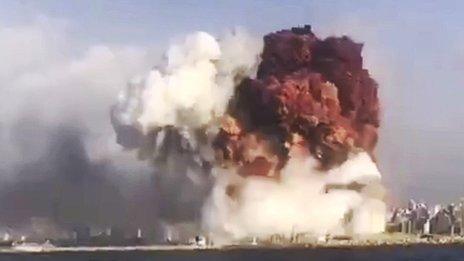Beirut explosion: Anti-government protests break out in city
- Published
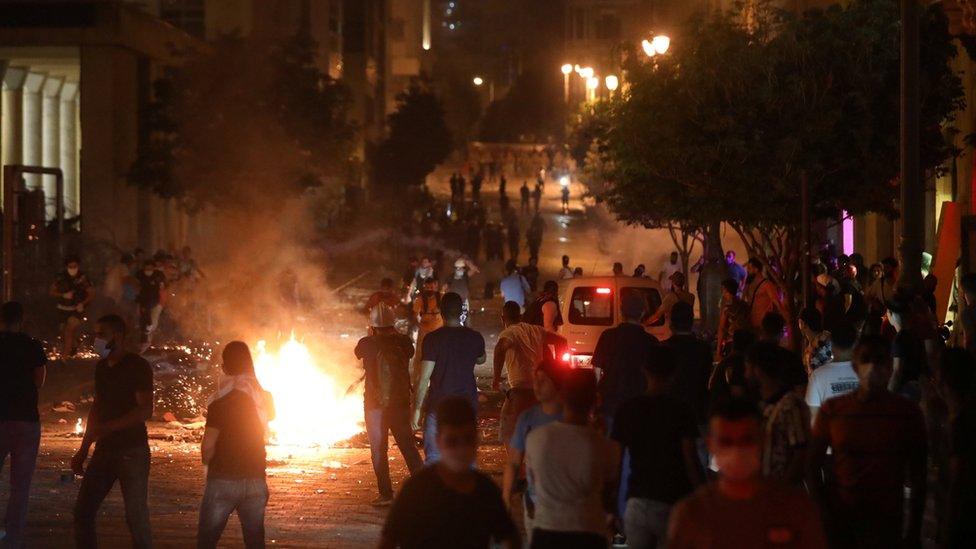
Dozens of people protested near parliament in Beirut
Protesters clashed with Lebanese security forces at anti-government demonstrations in Beirut on Thursday.
Officers deployed tear gas on dozens of people near parliament.
Demonstrators were angered by Tuesday's devastating blast, which officials say was caused by 2,750 tonnes of ammonium nitrate stored unsafely since 2013.
Many in Lebanon say government negligence led to the explosion, which killed at least 137 people and injured about 5,000 others.
The explosion destroyed entire districts in the capital, with homes and businesses reduced to rubble. Dozens of people are still unaccounted for.
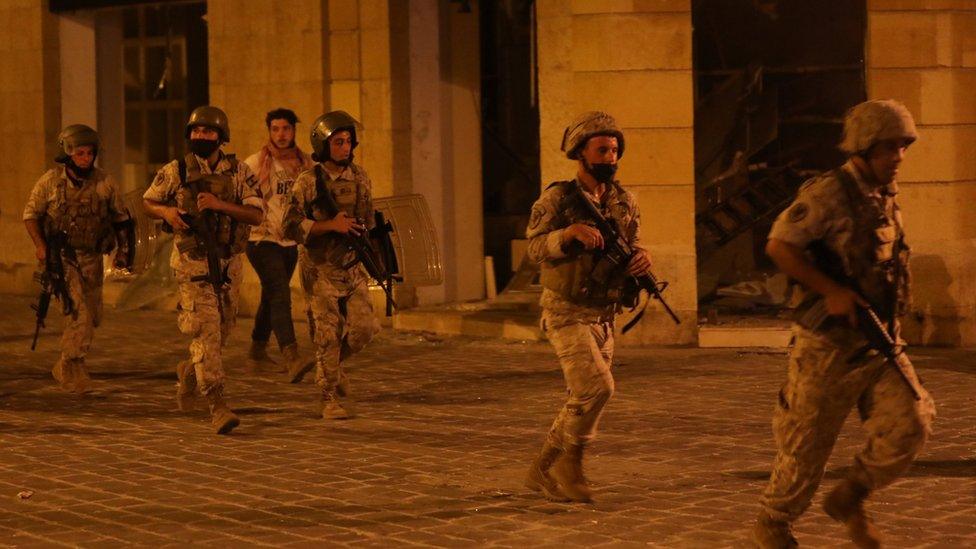
Officers deployed tear gas on the small crowd
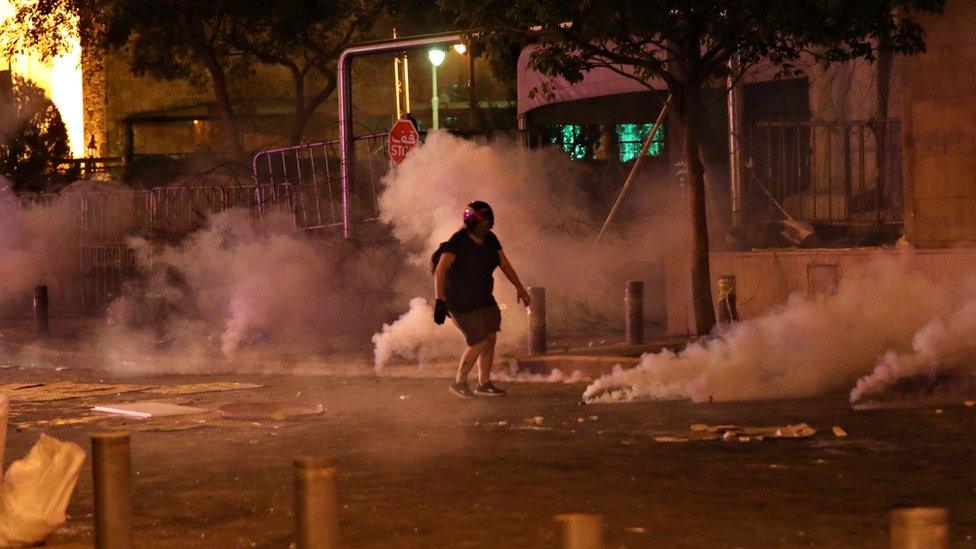
People have blamed government negligence, corruption and mismanagement for the blast
The state news agency says 16 people have been taken into custody as part of an investigation announced by the government this week.
Since the disaster two officials have resigned. MP Marwan Hamadeh stepped down on Wednesday, while Lebanon's ambassador to Jordan Tracy Chamoun stepped down on Thursday, saying the catastrophe showed the need for a change in leadership.
Earlier on Thursday, French President Emmanuel Macron also visited the city and said Lebanon needed to see "profound change" from authorities.
He also called for an international investigation into the disaster.
Aerial footage shows flattened buildings after an explosion in Beirut's port area

A city of sirens, empty buildings and empty streets
By Quentin Sommerville, BBC News, Beirut
This port was Lebanon's lifeline to the whole world. Something like 80% of the country's grain came through here. The grain silos, which were built way back when, are teetering. Just beyond there I can see a ship listing heavily. I've lived in Beirut for five years and it's almost unrecognisable - it's a city of sirens, of empty buildings, of empty streets.
As I look at the neighbourhood of Gemmayze just behind the port, I can't see a single pane of glass left. Entire roofs have gone - I can see friends' apartments, which are just open to the sky now. All of this area, which was really heavily populated, has been abandoned. No-one is coming back here any time soon.
What's really noticeable as you walk the streets here is that every second person seems to have a broom in their hand. There are clear-up teams everywhere, but it's pretty low tech: tiny teams of people with pans and brushes to clean up an an entire city's devastation.
The thing that really strikes me is how enormously stupid it was, what criminal negligence it took to leave this highly explosive material right in the very heart of this city, within yards of people, their homes, their businesses. And the authorities here knew - they had been warned that these chemicals were dangerous and that they were a great risk to Beirut and Lebanon.

Where did the ammonium nitrate come from?
In 2013 a Moldovan-flagged ship, the Rhosus, entered Beirut port after suffering technical problems during its journey from Georgia to Mozambique, according to Shiparrested.com, which deals with shipping-related legal cases.
The Rhosus was inspected, banned from sailing onward and was shortly afterwards abandoned by its owners, sparking several legal claims.
Its cargo included the ammonium nitrate, which is used as a fertiliser and as an explosive.
It was stored in a port warehouse for safety reasons, the report said, and it remained there for the next six years.
There are a lot of rules around storing ammonium nitrate, particularly around fire-proofing, because it is so highly explosive if it comes into contact with flames.
Rami Ruhayem has been to Gemmayze, the closest residential area to the port
The head of the port and the head of the customs authority said that they had written to the judiciary several times asking that the chemical be exported or sold on to ensure port safety.
Port General Manager Hassan Koraytem told OTV they had been aware that the material was dangerous when a court first ordered it stored in the warehouse, "but not to this degree".

More on the explosion in Beirut
IN PICTURES: Chaos and destruction
AMMONIUM NITRATE: What is it? How dangerous is it?
Q&A: What we know
THE CONTEXT: Why Lebanon is in crisis

Is there any hope of finding survivors?
Rescuers are continuing to search for people in Beirut, and security forces have sealed off a wide area around the blast site.
On Thursday, two days after the explosion, a French rescue team working in the city said there was still a good chance of finding survivors.
One unnamed rescuer told Mr Macron during his visit that they hoped to find a group of seven or eight people believed to be trapped in a "control room" under the rubble.
Meanwhile, Beirut's hospitals are feeling the strain of so many people needing medical care. Public Health Minister Hamad Hassan said Lebanon's health sector was short of beds, and lacked the equipment necessary to treat the injured and those in critical condition.
Beirut's governor Marwan Aboud also warned that as many as 300,000 people have been left homeless by the blast.
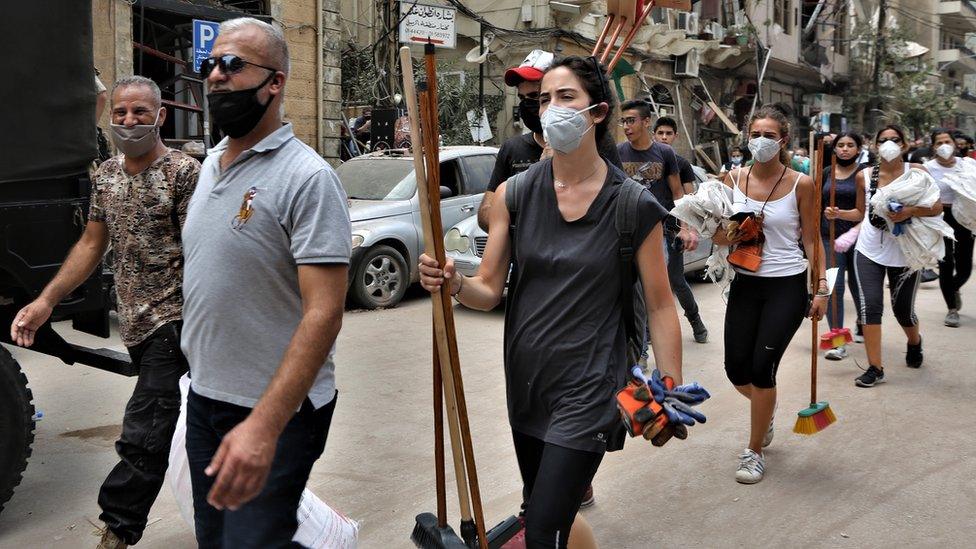
People in Beirut have been volunteering to clean up the rubble
Lebanon also imports most of its food. Because large quantities of grain stored in the port have been destroyed, there are fears that the country will face widespread food insecurity. The future of the port itself is in doubt too.
Was Lebanon already in crisis?
Before this disaster, Lebanon's hospitals were already struggling to cope with a rise in Covid-19 infections.
The country is also going through the worst economic crisis since the 1975-1990 civil war, and was seeing regular anti-government street protests.
People were having to deal with daily power cuts, a lack of safe drinking water and limited public healthcare.


Have you been personally affected by this story? If you feel able to do so please share your experiences by emailing haveyoursay@bbc.co.uk, external.
Please include a contact number if you are willing to speak to a BBC journalist.
WhatsApp: +44 7756 165803
Tweet: @BBC_HaveYourSay, external
Send pictures/video to yourpics@bbc.co.uk, external
Please read our terms & conditions and privacy policy
- Published5 August 2020
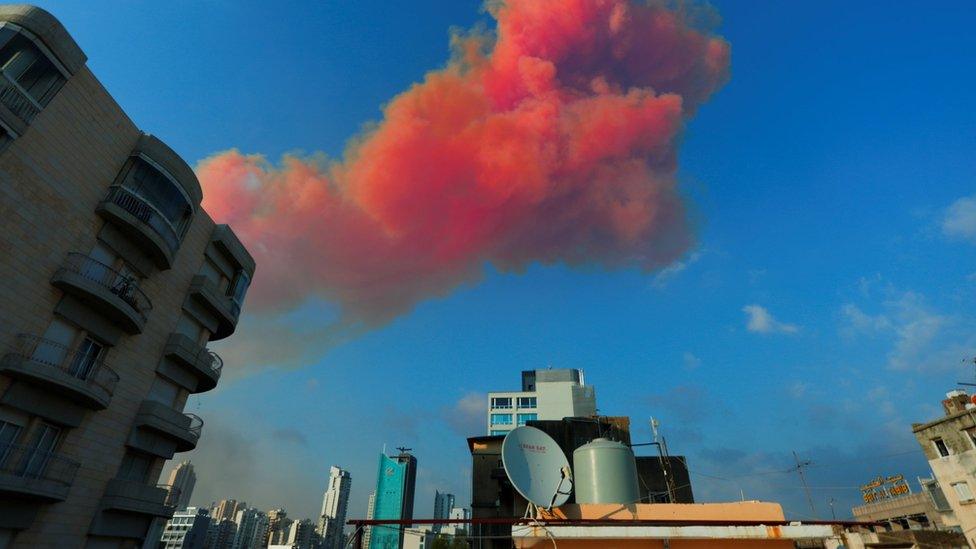
- Published5 August 2020
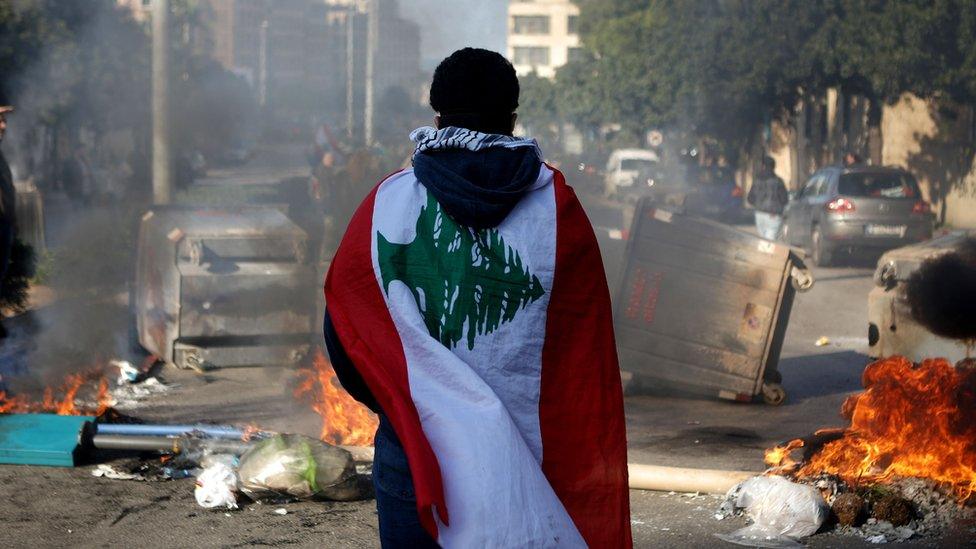
- Published4 August 2020
